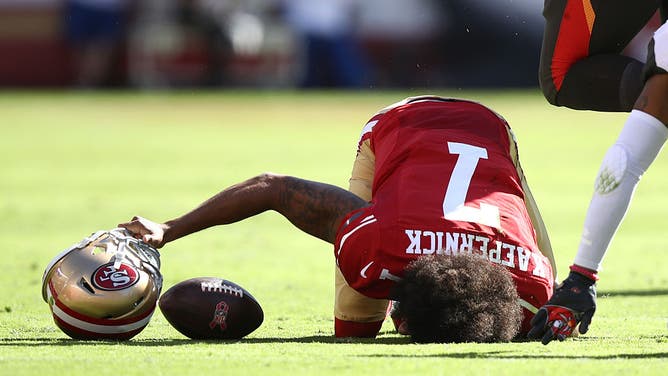Dez Bryant Blasts Colin Kaepernick For Creating Awareness But Delivering Nothing Tangible
During a recent podcast interview, former Dallas Cowboys receiver Dez Bryant spoke from the heart when asked about professional activist Colin Kaepernick. While speaking to podcast hosts and former NFL players Brandon Marshall, Chad Ochocinco, Fred Taylor, and Channing Crowder, Bryant lamented what he believed to be empty promises from the national anthem protests.
“I respect Colin Kaepernick, but there’s one thing that I don’t respect,” Bryant said.
“I love him to death, it ain’t no hate or nothing like that. But, brother, you had the biggest opportunity in the world to create jobs, to build jobs, to give jobs to people. The people you were talking about. The people that you were so-called ‘standing up for.’ People who stood beside you, people who lost their jobs because of you. Where you at? I ain’t heard from you. He brought the awareness and that’s why I respect him.”
Brandon Marshall interrupted and asked, “Where’s the call to action?”
“There wasn’t one, there wasn’t no call to action,” Bryant answered.

(Photo by Ezra Shaw/Getty Images)
Bryant has been making this point for years, often refusing to kneel for anthem in favor of looking for other solutions to racial injustices. In 2019, Bryant criticized Kaepernick directly for not having any “preparation or solution” behind his efforts.
Kaepernick apologists like to believe that activism cost him his NFL career, but Bryant points to the more likely cause. The kneeling campaign reflected a leftist discontent with America in general, instead of artfully constructing a movement to rectify a specific wrong. All told, the stunt (and then Kaepernick’s incessant refusal to drop the martyr status and work his way back into football the old fashioned way) reeked of irresponsibility and shortsightedness. Racial divisiveness is at an all-time high and faith in the American way of life continues to plummet, even though this country continually positions itself as the freest and most equitable in the world.
Hopefully someone like Bryant can transform a widely-held (if not grossly misplaced) attitude into real progress on some front that affects minority communities in a positive way.